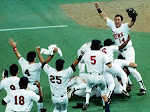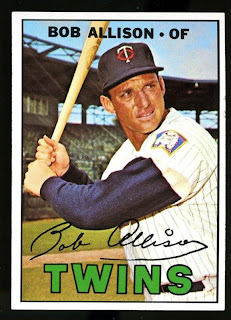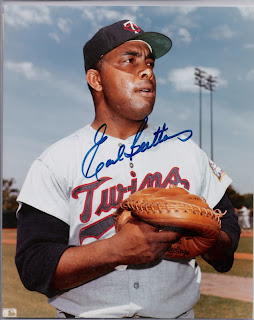
It was simply the most intense and supremely entertaining game I have ever witnessed in person. There is not a close second and most likely never will be. The Minnesota Twins defeated the Detroit Tigers 6-5 in the tiebreaker game for the Central Division crown of 2009. An unbelievable feat considering the puzzle pieces this season required the Twins to fit together. After Tuesday's instant classic between the Twins and Tigers my mind continues replaying what it saw with the understanding that what was witnessed was undoubtedly the finest Twins game played since Dan Gladden touched
homeplate securing the 1991 World Series for the hometown team.
Words can convey meaning lost to those that were eyewitness to an event. This game is a rare gem because those that were there and in front of the television know what they saw was impressionable on a grand scale. Those folks don't need words to understand what they saw. It will remain with them for a duration of time that is measurable in months, years or a lifetime. I was fortunate enough to sit down the right field line with my dad going through a game that was a microcosism of the season itself. Soon I was resigning myself to losing yet again in a
tiebreaking game. Then in the
next instant be jumping up and down and giving high fives to fans I had never met before after Orlando Cabrera gloved a line drive and doubled off Curtis
Granderson from first base allowing the Twins to escape an inescapable dilemma without allowing a run. From that high to the low of Alexi
Casilla's 10
th inning ill-fated dash towards home only to be thrown out. This prolonged a game that was agonizingly ulcer inducing and yet you knew you were watching a classic ballgame. Before either of these incidents there was the two run home run off the bat of Cabrera that put the Twins in the lead by a run by the score of 4-3. I leaned over to my dad after his mini blast into the first row of seats in left field and said "I don't want to have to watch the last 6 outs with only a one run lead." I need not worry. Matt
Guerrier allowed a home run on his second pitch in the top of the 8
th setting up the dramatics I already mentioned. One play already forgotten is the remarkable play Nick
Punto made with the bases loaded and one out in the top of the 12
th inning. Everyone through clinched fists was hoping for a double play. Instead
Punto caught a high chopper from Brandon Inge deep at his position of second base, knew a double play was not guaranteed, and fired a perfect throw to
Mauer for the force at home all in one motion. A
brilliant play by
Punto because of the quick thinking and physical skills required in that tense moment. A game changing play all instant classics have imbedded within them.
It was a classic, but if you were in the
Metrodome the tension, emotion, and utter joy upon actually winning and watching the Twins run around the field and high five fans was something to be savored. It was amazing to be there and be a part of it. Everywhere grown adults were jumping around, screaming, and high-
fiving each other. Let the Yankees have their corporate, well paid superstars who are suppose to come through in every clutch situation. Perfection is expected in New York. Having an imperfect player like Matt
Tolbert contribute mightily to victory last Tuesday makes the win more sweet. Those unexpected events in baseball are what keeps fans watching. They want to see what they haven't seen before and Twins fans most certainly did when their team defeated the Tigers for the 2009 Central Division crown.







 Earl Battey's 1963 season:
Earl Battey's 1963 season:




